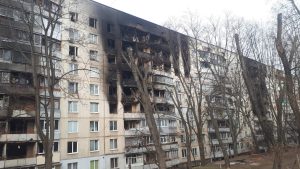Geopolitics pushes Ukraine crisis to the fore
Humanitarian agencies and experts have aired concerns that the overwhelming attention on Ukraine is draining resources from other crises around the globe which already face funding shortfalls.
Also, they say the war in Ukraine and sanctions on Russia have fuelled a global food shortage and price hikes for food and fuel.
The agencies say these conditions are affecting emergency aid delivery and food scarcity in several conflict-affected area, as well as in major refugee-hosting countries such as Bangladesh.
Nearly a year after the Russian invasion of Ukraine, the ongoing war has produced almost eight million refugees.
 Another seven million Ukrainians have lost their homes and are struggling to cope with shortages of food, water, shelter and other basic needs.
Another seven million Ukrainians have lost their homes and are struggling to cope with shortages of food, water, shelter and other basic needs.
But, comparatively, the international response to the Ukraine crisis has been remarkable.
Since January 2022, the US government has committed more than US$18.2 billion in military and security aid to Ukraine, with approximately $17.6 billion dedicated to train and equip Ukrainian armed forces.
And a 2022 global pledging campaign raised $8.9 billion, among the fastest and most generous responses a humanitarian flash appeal has ever received, according to the UN.
But the international attention focused on Ukraine comes at a time when other humanitarian crises around the world are receiving less attention and assistance than they need.
The outcomes in Ukraine contrasts with a recent pledging conference for Yemen, in which donors raised less than a third of the $4.3 billion the UN deemed necessary to respond to one of the world’s largest and most complex humanitarian emergencies
Also, more than one million Rohingya are currently living in the world’s largest refugee camp in Bangladesh, where there are issues with overcrowding, violence and insecurity.
Housing the Rohingya in Bangladesh costs about $1.2 billion a year, the Rohingya crisis has never received enough financial assistance and has been decreasing over time.
In 2020, donors contributed just 64 per cent of what was required, down from around 72 per cent two years earlier.
Funding for other protracted crises in 2022 appears to have suffered because of the overwhelming political interest in Ukraine.
The 2021 Afghanistan Humanitarian Response Plan was very well funded, at 112 per cent but, so far this year it has received only 46 per cent of its funding appeal.
The European Union has said it would not move funds from other global crises to respond to what is happening in Ukraine,
But EU member states have already begun diverting funds, with Sweden and Denmark announcing cuts to other aid priorities amounting to 14 and ten per cent respectively.
Sweden has already reallocated $150,000 from Sri Lanka – where millions face poverty following its economic and political crisis.
Denmark announced that it would defer development aid it had promised for Syria, Mail, Burkina Faso and Bangladesh to fund support for fleeing Ukrainians.
And the UK has recently announced it will halt all “nonessential” aid spending, with estimates saying this could amount to a 25 per cent cut.
Setting aside its generous support for Ukraine, the US has also cut its humanitarian budget by about $1 billion since 2021.
Experts say the COVID-19 pandemic compounded pre-existing humanitarian crises and increased funding needs. Yet, in its humanitarian appeal for 2021, the UN received less than 50 per cent of the funding it requested.
And this comes as the number of people without food, clean water, housing and medical care has passed 300 million, according to latest Global Humanitarian Assistance Report – 90million more than before the start of the COVID-19 pandemic.
The Norwegian Refugee Council is just one of the aid agencies that has drawn attention to the gap between funding for Ukraine and other crises.
“The war in Ukraine has highlighted the immense gap between what is possible when the international community rallies behind a crisis, and the daily reality for the millions of people suffering far from the spotlight,” the council said.
The Executive Secretary international aid group alliance the ‘Steering Committee for Humanitarian Response’, Gareth Price-Jones echoed the sentiment.
“If we care so much about people suffering in Ukraine, we should care as much about people in places like Somalia, Burkina Faso, South Sudan, Pakistan, where the scale of need is high,” Mr Gareth Price-Jones said.
“It’s so frustrating that other countries don’t get the level of support they’re entitled to. We’re struggling because they don’t have the same geopolitical element to them,” he said.
But geopolitics analyst Dr Ian Pringle says the fact that Russia is responsible for the crisis in Ukraine makes it more immediate and problematic for western donor nations.
“What you have is an aggressive nuclear power in Russia attacking a neighbour. Western nations, and particularly European states have an interest in making sure Russia doesn’t succeed,” he said.












